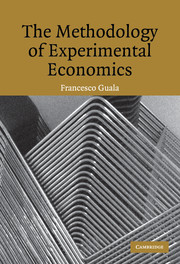Book contents
- Frontmatter
- Contents
- Analytical Table of Contents
- Acknowledgments
- 1 Introduction
- PART ONE INFERENCES WITHIN THE EXPERIMENT
- PART TWO INFERENCES FROM THE EXPERIMENT
- 7 External Validity
- 8 Economic Engineering
- 9 From the Laboratory to the Outside World
- 10 Experiments as Mediators
- 11 On Monetary Incentives
- Appendix A
- Appendix B
- Bibliography
- Index
10 - Experiments as Mediators
Published online by Cambridge University Press: 10 December 2009
- Frontmatter
- Contents
- Analytical Table of Contents
- Acknowledgments
- 1 Introduction
- PART ONE INFERENCES WITHIN THE EXPERIMENT
- PART TWO INFERENCES FROM THE EXPERIMENT
- 7 External Validity
- 8 Economic Engineering
- 9 From the Laboratory to the Outside World
- 10 Experiments as Mediators
- 11 On Monetary Incentives
- Appendix A
- Appendix B
- Bibliography
- Index
Summary
Two theses are prominent in the second part of this book. The first one is that we have no reason to believe a priori that an experimental result applies (or does not apply) to nonexperimental circumstances. The second thesis then follows quite naturally: successful external validity arguments are empirical and can be constructed only by appropriately combining experimental and field evidence. I have also tried to specify what counts as “appropriate” in this context, or what sort of requirements a strong external validity inference should satisfy.
In a way, at this stage I consider the important job to be done, but not because everything has been said on how experimental and field data can be used to draw external validity inferences. On the contrary, the analysis in Chapters 8 and 9, being so tightly linked to concrete example, is almost certainly incomplete. However, having discussed two paradigmatic examples and having sketched a broad theory of inference based on eliminative induction, I consider the definition of more sophisticated strategies an exciting research agenda for the future. In what remains of this book, then, I would like to elaborate on the image of experimental economics that emerges from the discussion so far.
It is important, for example, to realize that by endorsing the above two theses, one subscribes to a very specific view of experiments and their role in scientific discovery.
- Type
- Chapter
- Information
- The Methodology of Experimental Economics , pp. 203 - 230Publisher: Cambridge University PressPrint publication year: 2005



